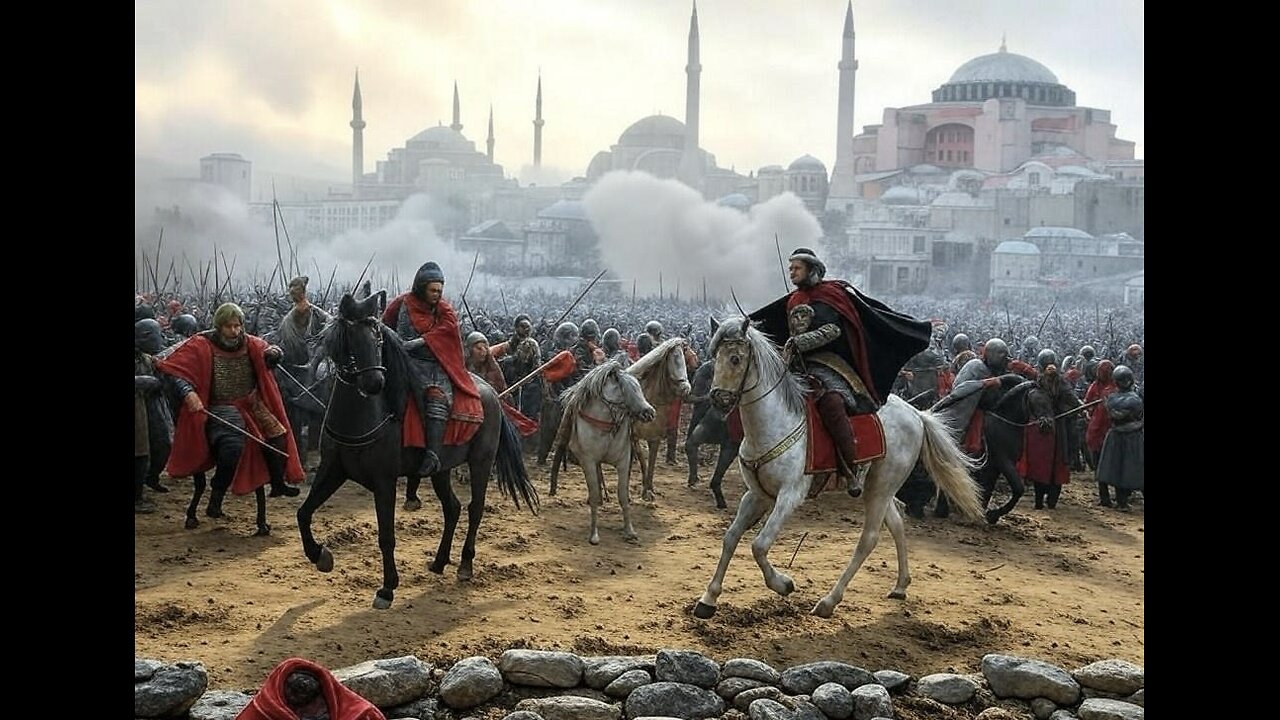Premium Only Content

The fall of Constantinople
The fall of Constantinople, which occurred on May 29, 1453, was a pivotal event marking the end of the Byzantine Empire and the rise of the Ottoman Empire as a major power in Europe and the Near East. Here's a concise description of the event:
The Fall of Constantinople (1453):
- Background: Constantinople, once the grand capital of the Eastern Roman (Byzantine) Empire, had been in decline for centuries due to internal strife, economic troubles, and repeated sieges by various powers. By 1453, it was a shadow of its former glory, with a significantly reduced population and weakened defenses.
- The Siege: The Ottoman Sultan Mehmed II, known as "Mehmed the Conqueror," launched a massive siege on Constantinople. His army, equipped with new technology like large cannons, including the famous "Basilica" cannon, besieged the city. The siege lasted for nearly two months, with several unsuccessful attempts to breach the walls until the final assault.
- The Attack: On the morning of May 29, 1453, after intense bombardment, Ottoman forces managed to breach the walls near the Gate of St. Romanus. Despite fierce resistance, the city's defenders, led by Emperor Constantine XI, were overwhelmed by the sheer numbers and strategic prowess of the Ottoman troops.
- The Capture: Constantine XI died during the battle, and Constantinople fell to the Ottomans. The event is often remembered for the brutal sack of the city that followed, although Mehmed II quickly moved to restore order, converting the Hagia Sophia into a mosque and repopulating the city to reestablish it as the Ottoman capital.
- Consequences:
- Political: The fall of Constantinople ended the Byzantine Empire, which had lasted over 1,000 years. It cemented Ottoman control over the eastern Mediterranean and established Istanbul (renamed from Constantinople) as a major cultural and political center.
- Religious: The event marked a significant shift in the religious landscape, with Islam becoming more dominant in the region. The conversion of Hagia Sophia symbolized this change.
- Cultural: The influx of Greek scholars to the West before and after the fall contributed to the Renaissance, bringing with them ancient texts and knowledge.
- Legacy: This event has been seen through various lenses over time - as a tragic loss for Christendom by some, a glorious conquest by others, and universally as a turning point in world history.
The fall of Constantinople is not just a military event but a profound cultural and historical shift, influencing the course of European, Middle Eastern, and global history.
-
 LIVE
LIVE
SpartakusLIVE
5 hours agoI'M BACK || Quads w/ The Boys
528 watching -
 9:33
9:33
Ken LaCorte: Elephants in Rooms
8 hours ago $0.03 earnedWhy Do Black Men Love Big Butts?
612 -
 2:12
2:12
From Zero → Viral with AI
1 day ago🚀 AI Marketing Isn’t Just for Big Brands Anymore — Here’s Why
27 -
 9:51:58
9:51:58
Dr Disrespect
12 hours ago🔴LIVE - DR DISRESPECT - 10 WINS ON CONTROLLER - BO7 TOMORROW
268K17 -
 1:24:56
1:24:56
Glenn Greenwald
5 hours agoTrump Declares Cities as the Enemies Within; Reagan Appointed Judge Slams Trump Over Speech Crackdowns; American ER Doctor on Gaza Atrocities | SYSTEM UPDATE #524
96.4K80 -
 LIVE
LIVE
I_Came_With_Fire_Podcast
11 hours agoPete Hegseth and the Chamber of Standards | Digital IDs | Taiwan Chips & Salsa | CDL Crisis
262 watching -
 LIVE
LIVE
Adam Does Movies
11 hours agoTalking Movies + Ask Me Anything - LIVE
39 watching -
 29:11
29:11
Nick Shirley
3 hours ago $0.97 earnedPortland has Fallen... ANTIFA Take Control of City
5.93K12 -
 1:19:00
1:19:00
VapinGamers
3 hours ago $0.20 earnedJump Space - We All Scream in Space - Early Access - !rumbot !music
7.95K -
 1:50:12
1:50:12
Joker Effect
2 hours ago(Kick) Streamers Have Ruined The Streaming Landscape and Here is How! Reviewing Phase Partners...
15.2K1